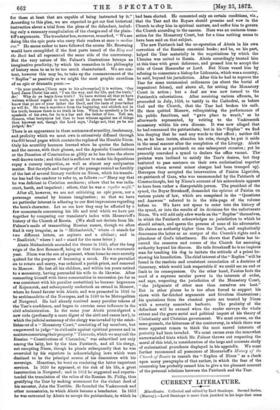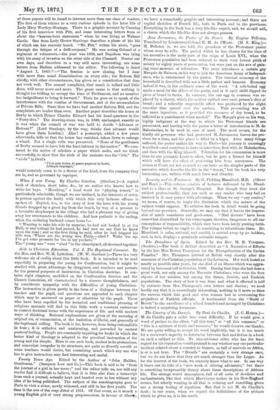CURRENT LITERATURE.
Miscellanies. Collected and edited by Earl Stanhope. Second Series. (Murray).—Lord Stanhope is more than justified in his hope that some
of these papers will be found to interest more than one class of readers. The first of them relates to a very curious episode in the later life of Lady Mary Wortley-Montagti. There is a graphic account by Canning of his first interview with Pitt, and some interesting letters from or about the "heaven-born statesman" when he was living at Widmer Castle. One from Lady Hester Stanhope describes a phase of his life of which one has scarcely heard. "Mr. Pitt," writes his niece, "goes through the fatigue of a drill-serjeant." He was acting Colonel of a regiment of volunteers,—the year was 1803, and Napoleon was lying with his army of invasion on the other side of the ChanneL Nearer our own days, and therefore in a way still more interesting, are some letters from Hallam addressed to the editor. The following is dated "August 1, 1845:"—" The Session is now closing, but I hear with more than usual dissatisfaction on every side ; the Reform Bill chiefly, with other circumstances, has given us a constitution that does not work well. The annual complaint., that much is talked and little done, will recur more and more. The great cause is that nothing is thought too trifling to occupy the time of Parliament, and no member too insignificant to bring it forward." Then he goes on to speak of the interference with the routine of Government, and of the accumulation of Private Bills. Since then we have had another Reform Bill, and the complaints are louder than ever. Another paper describes the house at Derby in which Prince Charles Edward had his head-quarters in the "Forty-five." The drawing-room was, in 1839, unchanged, exactly as it was when the council of war was held to decide "Advance or Retreat ?" (Lord Stanhope, by the way, thinks that advance would have given them London.) Alas ! a postscript, added a few years afterwards, tells us that the house has vanished, taken down to enlarge a wharf. Not a single relic was preserved. "None of the gentlemen of Derby seemed to have felt the least interest in the matter." We com- mend to the notice of scholars a paper which seeks, and we think successfully, to show that the viola of the ancients was the iris." The "violce" in Ovid's
o ut si quis violas, Fri pare papaver in horto, Liliaque impingst,"
would certainly seem to be a flower of the kind, from the company they are in, and as governed by impingat.



































 Previous page
Previous page